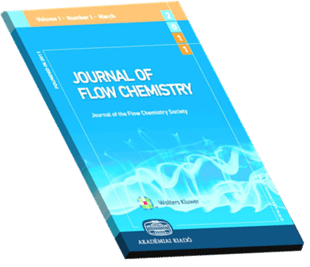Journal of Flow Chemistry
In 2010, the Flow Chemistry Society was formed by internationally recognized flow chemistry experts to unite and represent those who are actively working on this rapidly evolving field. One of the particular missions of the Society is to promote the communication between the scientists both in academic field and industry and rapidly deliver new knowledge making widely available for the entire chemistry community.
As part of the communication initiative, the Flow Chemistry Society entered into strategic partnership with a Kluwer’s affiliate in Budapest (Akadémiai Kiadó) to launch the Journal of Flow Chemistry. The Journal was introduced to the scientific community at the Flow Chemistry Europe Conference in Munich, Germany in March, 2011. The Journal was subsequently launched at the ACS National meeting (August 28-September 1, 2011) held in Denver, Colorado, USA. As of January 2018, Springer and Akadémiai Kiadó co-publish the official journal of the Flow Chemistry Society.
The vision of the journal is to transform flow reactors into the go-to technology for chemists and engineers in chemical discovery and production. Flow reactors should be come as common as round-bottom flasks in the chemical laboratory. This vision is rooted in our belief that every chemist can do flow chemistry on the condition that they are well-informed in the fundamentals of the discipline. Hence, it is our mission to inform, educate and stimulate new generations of chemists in carrying out chemical transformations in flow.
The primary objective of the Flow Chemistry Journal is to stimulate the development and advancement of flow chemistry in all layers of the chemistry community, including academia and industry. The Journal provides a high-level scientific forum for rapid communication of the latest results of flow chemistry and dessiminate the most important information on scientific events, technology developments, products, etc.
The journal aims to publish the very best work related to flow chemistry, including new and exciting research, relevant reviews and even articles centered around teaching. The focus is on new synthetic transformations, material science, process design, automation, industry 4.0, inline analytics, etc. In addition, also relevant engineering articles on flow chemistry are welcome.

Impact Factor 2023: 2.0
Editor-in-Chief: Timothy Noël (University of Amsterdam) from January 1st, 2019
Founding Editor-in-Chief: C. Oliver Kappe (University Graz) 2011-2018
Associate Editors: Marcus Baumann (University College Dublin), Norbert Kockmann (TU Dortmund University), Jean-Christophe Monbaliu (University of Liège), Luca Capaldo (University of Parma)
Editorial Assistant: Michael Findlay (University of Amsterdam)
Regional Editors: Aaron Beeler (Boston University), Volker Hessel (University of Adelaide), Amol A. Kulkarni (CSIR-National Chemical Laboratory), Guangsheng Luo (Tsinghua University), Rodrigo de Souza (Federal University of Rio de Janeiro)
Editorial Board: Claude De Bellefon (CNRS Lyon), Ferenc Darvas (Florida International University), Timothy Jamison (Massachusetts Institute of Technology), Tanja Junkers (Monash University), C. Oliver Kappe (University of Graz), Dong-Pyo Kim (Postech), Takehiko Kitamori (University of Tokyo), Shu Kobayashi (University of Tokyo), Andrew J. de Mello (ETH), Peter Seeberger (Max Planck Institute), Thomas Wirth (Cardiff University)
International Advisory Board: Rigoberto Advincula (Case Western Reserve University), György Dormán (University of Szeged), Heidrun Gruber-Woelfler (University of Graz), Holger Löwe (Johannes Gutenberg University Mainz), D. Tyler McQuade (Virginia Commonwealth University), Michael G. Organ (Ottawa University), Dominique Roberge (Lonza Inc.), Berthold Schenkel (Novartis Pharma AG), Paul Sharratt (ICES), Christian Stevens (Ghent University), Yuanhai Su (Shanghai Jiao Tong University)
